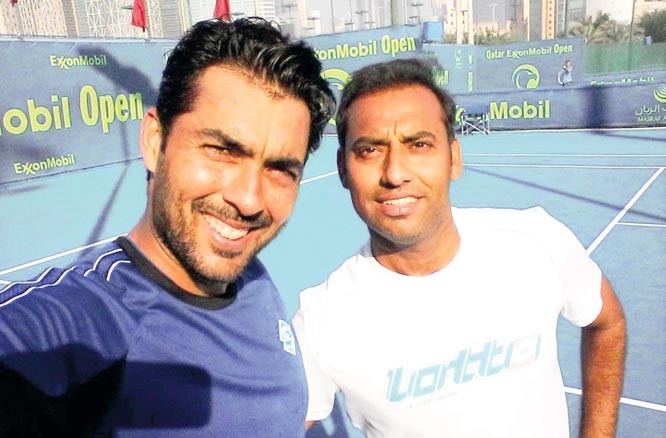

It was bound to happen. The two incomparable legends of Pakistan tennis, who have been carrying the team, and their hopes, despite the turmoil -- on and off the court -- had to be found out one day. The fortress breach was long coming.
Last weekend, Pakistan lost its first Davis Cup tie on grass under Aisam-ul-Haq and Aqeel Khan since 1998. For two decades, the duo had made Pakistani grass courts a citadel for the national tennis side, much like UAE was for the Test side in cricket -- with prodigiously less backing, financial and otherwise.
But even the trademark Pakistani grass couldn’t prevent the two veterans -- both 38 years old -- from succumbing to defeat against Uzbekistan in the Davis Cup Asia-Oceania Zone Group 1 tie, which Pakistan eventually lost 4-1.
It is evident that after putting themselves on the line for the call of duty for over 20 years, age has caught up with Aisam and Aqeel, as they struggle to keep pace with the modern game, facing younger and quicker challengers.
Of course, the main challenger in this particular tie wasn’t exactly a fountain of youth, as 31-year-old Denis Istomin carried Uzbekistan in all three of their match wins -- minus the dead rubber.
Istomin famously beat Novak Djokovic in the Australian Open second round last year, and in the past five years has had wins over Lleyton Hewitt, John Isner, Sam Querrey, Pablo Carreno Busta and Marin Cilic. He has been ranked as high as 33 in the ATP singles rankings.
Pakistan captain Muhammad Khalid has been criticised for putting Aisam up against Istomin in the very first match of the tie, which in hindsight proved costly, even if the duo served up an absolute treat in the first set tie-break that finished 19-17 in the Uzbek’s favour.
Aisam went on to lose 7-6, 4-1, after retiring hurt in the middle of the second set, with his body clearly struggling to keep up with the intensity with which Istomin was playing in what was the Uzbek’s least favourite surface.
Aqeel Khan, however, brought Pakistan back into the tie, beating Sanjar Fayziev 6-7, 6-4, 6-4 in the hard-fought second singles. But the ramifications of the two tough singles were visible in what was a shock 6-2, 6-4 against Istomin and Jurabek Karimov in the doubles fixture.
Even though Istomin was again the difference between the two sides, it was evident that the Pakistani pair was struggling to perform at their optimum in the doubles, which for the past two decades has been Pakistan’s forte, with Aisam being a regular in the world’s top 10 for doubles this decade.
Istomin then completed the rout with a 6-1, 6-3 win over a hapless Aqeel, who was visibly below par and struggled to cope with the daunting task ahead of him -- even though that’s precisely what he has been doing for Pakistan for the past two decades, including as recently as September when he beat Thailand’s Kittipong Wachiramanowong in the deciding rubber to send Pakistan to Group I of the Asia-Oceania Zone.
A 6-3, 6-1 demolition was in store for Muzammil Murtaza against Sultanov in the dead rubber, to further drive home the question that everyone has been asking for at least a decade, but one whose answer is imminent: what does life after Aisam and Aqeel look like for Pakistan tennis?
Thanks to Pakistan’s 4-0 win over South Korea in February, the team would remain in Group I until next year, despite the defeat against Uzbekistan. But having both ties at home this year means that they play away in 2019, on surfaces that would be anything but grass.
More critically, next year both Aisam and Aqeel would turn 39, and if they couldn’t overcome a one-man Uzbekistan side at home, Pakistan could struggle big time in dealing with more balanced sides away.
In addition to Aisam and Aqeel, Pakistan have tried a gamut of players in the Davis Cup squad in recent years to answer the aforementioned question -- the likes of Shahzad Khan, Jalil Khan, Samir Iftikhar, Yasir Khan, Mohammed Abid, Abid Ali Akbar and this month Heera Aashiq and Muzammil Murtaza -- all of whom have struggled at varying degrees.
Of these, Abid Akbar and Samir Iftikhar -- both of whom are currently in the US -- have had partial successes, but those too were in the lower tiers. And so, to expect this lot to even keep Pakistan where they are is a gigantic ask, let alone take them forward.
As unfortunate as it is, it is evident that Pakistan would continue to rely on Aisam and Aqeel even on the other side of 40, to even keep the team in Group II, where they could be heading after next year.
But the gauntlet has been thrown to everyone else to step forward and take over the mantle from the two middle-aged veterans and, if nothing else, prevent a plummet for Pakistan tennis that one can see coming. However, truth be told, the gauntlet has been lying on the floor, unattended, for the good part of a decade.
For the Pakistan Tennis Federation, the aim should be to look at the long-term future and invest in the juniors and Under 14s, so that they can come good in the coming decade, and maybe take Pakistan to a point where they can dream of the World Group and Grand Slam participants as they were in 2005.